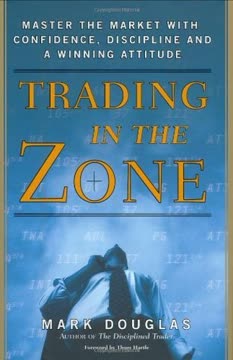Key Takeaways
1. Trading is a business of uncertainty, risk-taking, and speculation
"Trading is the game of probability and uncertainty. Therefore, sticking to your stop losses is a key aspect of successful trading."
Embrace uncertainty. Trading is fundamentally different from other businesses or careers. It requires comfort with ambiguity and a willingness to take calculated risks. Successful traders understand that:
- Every trade has an uncertain outcome
- Losses are an inevitable part of the process
- Risk management is critical for long-term survival
- Probabilistic thinking is essential for decision-making
To thrive in this environment, traders must develop a mindset that accepts uncertainty while still making decisive actions based on their analysis and strategy.
2. Resilience is crucial for surviving the emotional rollercoaster of trading
"Resilience is one of those mysteries of the human psyche that I have had a fascination with for many years."
Cultivate mental toughness. The ability to bounce back from setbacks is essential for traders. Resilience allows you to:
- Recover quickly from losses and mistakes
- Maintain confidence in your strategy during drawdowns
- Learn from failures rather than being demoralized by them
- Stay focused on long-term goals despite short-term challenges
Developing resilience involves:
- Practicing self-reflection and emotional regulation
- Building a support network of fellow traders
- Maintaining perspective on both wins and losses
- Continuously improving your skills and knowledge
3. Psychological hazards can derail even the most promising traders
"Averaging down on losing trades is a very common practice among new traders."
Beware of common pitfalls. Many psychological traps await traders, including:
- Averaging down: Adding to losing positions in hopes of a turnaround
- Revenge trading: Trying to quickly recover losses through risky trades
- Overtrading: Making too many trades out of boredom or FOMO
- Emotional decision-making: Letting fear or greed drive your actions
Recognizing these hazards is the first step in avoiding them. Develop a trading plan that addresses these potential issues and stick to it rigorously.
4. Develop psychological safeguards to protect your trading career
"Setting daily profit targets / finishing your day"
Build protective habits. Implement safeguards to maintain emotional balance and protect your capital:
- Set daily profit targets and stop trading when reached
- Establish and adhere to maximum daily loss limits
- Take regular breaks to maintain focus and perspective
- Practice mindfulness techniques to stay present and calm
These habits create structure and discipline, helping you avoid impulsive decisions and maintain a long-term perspective on your trading career.
5. Focus on building TradeBooks and mastering a few key strategies
"Our philosophy in trading is that you need to master only a few solid setups (and TradeBook them!) in order to be consistently profitable."
Specialize and document. Rather than trying to master every possible trading setup, focus on:
- Developing expertise in a small number of high-probability strategies
- Creating detailed TradeBooks for each strategy, including:
- Specific criteria for stock selection
- Clear rules for entry, exit, and risk management
- Performance metrics and continuous improvement notes
By specializing and documenting your approach, you develop deeper expertise and create a systematic, repeatable process for success.
6. Know yourself as a trader and define realistic goals
"You need to find what type of day trader you are best suited to be."
Self-awareness is key. Understand your:
- Risk tolerance
- Emotional tendencies
- Cognitive strengths and weaknesses
- Preferred trading style (e.g., scalping, swing trading)
Set realistic goals that align with your personality and circumstances. Focus on process-oriented objectives rather than purely financial targets. Examples:
- Improve trade execution speed by 20%
- Reduce emotional decision-making incidents by 50%
- Maintain a risk-reward ratio above 1:2 for 90% of trades
7. Cultivate a disciplined lifestyle to support your trading success
"You cannot be more disciplined in your trading as you are in your life."
Holistic approach to success. Recognize that your performance as a trader is influenced by your overall lifestyle. Key areas to focus on:
-
Physical health:
- Regular exercise to reduce stress and improve cognitive function
- Balanced nutrition to maintain energy and focus
- Consistent sleep schedule for optimal mental performance
-
Mental well-being:
- Stress management techniques (e.g., meditation, journaling)
- Continuous learning and skill development
- Maintaining work-life balance to prevent burnout
-
Professional habits:
- Structured daily routine for market analysis and trading
- Regular performance reviews and goal-setting
- Networking with other traders for support and learning
By cultivating discipline in all areas of life, you create a foundation for sustained success in the challenging world of trading.
Last updated:
FAQ
What's Mastering Trading Psychology about?
- Focus on Psychology: Mastering Trading Psychology by Andrew Aziz emphasizes the psychological aspects of trading, highlighting how emotions, mindset, and self-discipline impact trading performance.
- Real-Life Experiences: The book includes firsthand accounts from various traders, sharing their struggles and successes, which helps readers relate to the challenges of trading.
- Three Pillars of Success: It outlines technology, strategy, and psychology as the three essential components for successful trading, with a strong focus on the psychological aspect.
Why should I read Mastering Trading Psychology?
- Enhance Trading Performance: The book provides insights into how mental skills can significantly improve trading outcomes, making it a valuable resource for both novice and experienced traders.
- Learn from Others: By sharing real-life stories, the book allows readers to learn from the mistakes and successes of others, which can help avoid common pitfalls.
- Comprehensive Approach: It covers various aspects of trading psychology, including risk management, emotional control, and the importance of a disciplined lifestyle.
What are the key takeaways of Mastering Trading Psychology?
- Resilience is Key: The book stresses that resilience is crucial for traders to recover from losses and maintain a positive mindset.
- Focus on Process, Not Money: Successful traders concentrate on executing their trading plans rather than fixating on monetary outcomes.
- Set Realistic Goals: Emphasizes the importance of setting achievable goals that prioritize skill development over immediate financial success.
What is the "Trilogy of Success" in Mastering Trading Psychology?
- Three Essential Components: The trilogy consists of technology, strategy, and psychology, which together form the foundation for successful trading.
- Interconnectedness: Removing any one of these pillars can lead to failure, emphasizing the need for a balanced approach.
- Psychology as a Pillar: While technology and strategy are important, psychology is often the most overlooked yet critical aspect of trading success.
How does Mastering Trading Psychology define resilience in trading?
- Capacity to Recover: Resilience is described as the ability to recover quickly from difficulties and setbacks, essential for traders facing losses.
- Mental Toughness: It is a measure of mental toughness, allowing traders to endure the emotional rollercoaster of trading.
- Learning from Hardship: Resilient traders learn from their mistakes and use those experiences to improve their trading strategies.
What are some common psychological hazards in trading according to Mastering Trading Psychology?
- Averaging Down: Identified as a significant psychological hazard that can lead to account blow-ups.
- Revenge Trading: Engaging in revenge trading after losses often results in further losses and emotional distress.
- Overtrading: Warns against overtrading, which can stem from emotional impulses rather than sound trading strategies.
What is the advice on setting goals in Mastering Trading Psychology?
- Define Realistic Goals: Encourages traders to set clear, achievable goals based on their trading strategies and risk tolerance.
- Daily and Weekly Targets: Suggests establishing daily and weekly profit targets, as well as maximum loss limits, to maintain discipline and focus.
- Focus on Process: Goals should be process-oriented rather than solely profit-driven, helping traders to stay grounded and avoid emotional trading.
How does Mastering Trading Psychology suggest handling losses?
- Accept Losses as Normal: Stresses that losses are an inevitable part of trading and should be accepted rather than feared.
- Reflect and Learn: After a loss, traders are encouraged to reflect on what went wrong and learn from the experience.
- Take Breaks: Advises taking breaks after significant losses to regain composure and prevent emotional decision-making.
What is the significance of emotional control in trading according to Mastering Trading Psychology?
- Control Over Emotions: Emotional control is highlighted as a critical skill for traders, as uncontrolled emotions can lead to poor decision-making.
- Mindfulness Techniques: Suggests using mindfulness and self-reflection to manage emotions and maintain focus during trading.
- Avoiding Impulsive Decisions: By developing emotional control, traders can avoid impulsive decisions driven by fear or greed.
What are some strategies for improving trading psychology mentioned in Mastering Trading Psychology?
- Journaling: Recommends maintaining a trading journal to track emotions, decisions, and outcomes, which can help identify patterns.
- Community Support: Engaging with a trading community for support and accountability is emphasized as a way to build resilience.
- Mindfulness Practices: Encourages incorporating mindfulness practices to enhance self-awareness and emotional regulation.
What are the best quotes from Mastering Trading Psychology and what do they mean?
- “Scared money never wins.”: Underscores the importance of confidence in trading, as fear can lead to poor decision-making.
- “You learn more from other people’s failures than their successes.”: Emphasizes the value of learning from mistakes, providing critical insights for better strategies.
- “Trading is not an endurance sport.”: Reminds traders that they don’t need to be in the market constantly, focusing on waiting for the right opportunities.
How can I create a successful trading routine based on Mastering Trading Psychology?
- Establish a Morning Routine: Suggests starting the day with a consistent routine that includes exercise and preparation.
- Develop a Watchlist: Traders should create a watchlist of stocks to monitor closely for better analysis and decision-making.
- End-of-Day Reflection: Incorporating a daily recap of trades helps reinforce learning and self-reflection.
Review Summary
Mastering Trading Psychology receives mixed reviews, with an overall rating of 4.30/5. Many readers praise its insights on self-discipline, emotion management, and trading strategies. Some find the book valuable for both novice and experienced traders, appreciating its modern context and relatable experiences. However, critics argue it's repetitive, lacks original content, and relies too heavily on user comments. Some readers suggest it could be more concise and focused. Despite criticisms, many find it helpful in understanding trading psychology and avoiding common mistakes.
Similar Books










Download PDF
Download EPUB
.epub digital book format is ideal for reading ebooks on phones, tablets, and e-readers.





